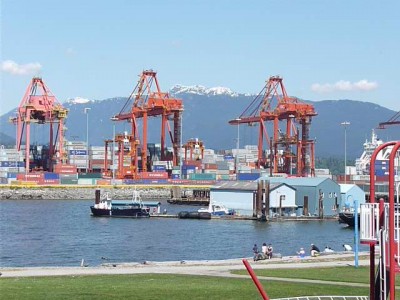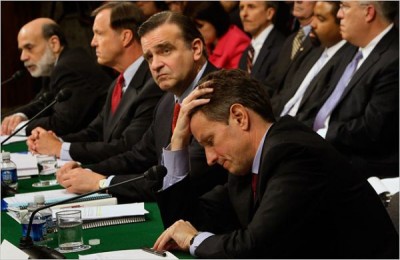
Bad ones shouldn’t.
I recently read an embarrassingly naïve blog post by an economist criticizing the Obama administration and Tim Geithner of the Treasury for their export strategy of doubling strategy over the next 5 years. The blogger’s take was that you cannot increase exports without softening the dollar {making exports relatively cheaper}, at least in the short run, and that that makes no sense to him. Huh?
Well, I’m no fan of Geithner and his policies, but I’m also not a fan of handwaving economics that makes observations at the 50,000 foot level and ignore complexity and the role of organizations and strategy.
First off, I tend to agree with Fortune reporter Nin-Hai Tseng, who says that devaluing the dollar is a bad idea and that the problem with the dollar these days is its volatility. Travelling in Canada with an Visa card with a US-based bank, Wells Fargo, I got to see first hand how volatile the US dollar can be with respect to its northern counterpart. Such volatility makes business decisions riskier and much of my doctoral dissertation way back when demonstrated how at the organizational level, operational volatility has a negative effect on brands, accounting profits, and stock price.
This week, one of this big G20 concerns is currency wars, particularly in the wake of the “quantitative easing” plans by the US Federal Reserve that is pumping $600B into the economy over the next 8 months. Well, the idea is in the short run to stimulate exports, although with a “currency war”, other nations attempt to devalue their currencies to do the same. What’s the bottom line, in terms of what’s going on now? Tseng reports::
“Who knows how low the dollar might fall, but so far the drop of its value has accelerated with the second round of quantitative easing. After reaching a one-year high on June 7, the dollar weakened 7.5% against a basket of major currencies through the end October, and a whopping 18% against the euro.
All the while, the outlook for U.S. exports looks strong as household incomes grow in emerging economics including China, India and Brazil grow. In September, U.S. exports climbed to the highest level in two years, increasing by 0.3% to $154.1 billion, the US Commerce Department reported Wednesday. This helped narrow the trade deficit by 5.3% to $44 billion.
It’s true that exports only make up about 12% of the US economy, but with GDP growth so anemic, the trend in exports might actually add to growth in the short-run.”
A big issue is increased protectionism, although it should be noted that the “quantitative easing” is a form of trade barrier in that it devalues the US dollar, and increased tariffs and protectionist policies that inhibit trade could erase any export gains and cause the economy to slump further. A weakened dollar also makes imports more expensive, which could allow for increased import substitution, where buyers buy {and hire} domestically {as opposed to outsourcing}.
From an organizational point of view, a critical factor in an international business strategy is the delivery of value in global markets. Sure, currency devaluation helps, but it’s not the only factor, which is my beef with overly-generalized statements by economists. I feel that North American competitiveness, given relatively high wages and standard of living, is contingent on developing markets that leverage distinctive competencies and exports of new innovations and technologies. Rather that quibble with the South Koreans about allowing gas-guzzling US-manufactured vehicles to be exported, I’d much rather see increased focus and spending on the development and market development of US innovations. I’d like to see Canada do the same, increasingly shifting from natural resources towards increased value-added, technology, and innovation, using alliances and networks to jumpstart competitiveness, particularly in areas such as medical {red} biotech.
In the short-run, the “quantitative easing” might allow exports to pump some much-needed growth into the economy and at this point, anything helps. Does this make no sense? I think it actually does make sense, but I doubt if the Obama administration expects to fuel a doubling of exports with a weak dollar strategy for years and years.
Twitterversion:: [blog] Economist criticizes Obama/Geithner for export and dollar devaluation policies. Dismal science or dismal intellect? @Prof_K


